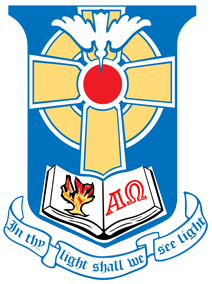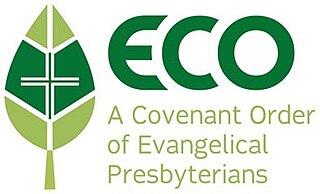
Presbyterianism is a Reformed (Calvinist) Protestant tradition named for its form of church government by representative assemblies of elders. Though other Reformed churches are structurally similar, the word Presbyterian is applied to churches that trace their roots to the Church of Scotland or to English Dissenter groups that formed during the English Civil War.

The Presbyterian Church (USA), abbreviated PCUSA, is a mainline Protestant denomination in the United States. It is the largest Presbyterian denomination in the country, known for its liberal stance on doctrine and its ordaining of women and members of the LGBT community as elders and ministers. The Presbyterian Church (USA) was established with the 1983 merger of the Presbyterian Church in the United States, whose churches were located in the Southern and border states, with the United Presbyterian Church in the United States of America, whose congregations could be found in every state.
Presbyterianpolity is a method of church governance typified by the rule of assemblies of presbyters, or elders. Each local church is governed by a body of elected elders usually called the session, though other terms, such as church board, may apply. Groups of local churches are governed by a higher assembly of elders known as the presbytery or classis; presbyteries can be grouped into a synod, and presbyteries and synods nationwide often join together in a general assembly. Responsibility for conduct of church services is reserved to an ordained minister or pastor known as a teaching elder, or a minister of the word and sacrament.

The Presbyterian Church in America (PCA) is the second-largest Presbyterian church body, behind the Presbyterian Church (USA), and the largest conservative Calvinist denomination in the United States. The PCA is Reformed in theology and presbyterian in government.

The Cumberland Presbyterian Church is a Presbyterian denomination spawned by the Second Great Awakening. In 2019, it had 65,087 members and 673 congregations, of which 51 were located outside of the United States. The word Cumberland comes from the Cumberland River valley where the church was founded.

The Non-subscribing Presbyterian Church of Ireland is a non-creedal Christian denomination, which maintains a great emphasis on individual conscience in matters of Christian faith. Today, the denomination has thirty-four congregations on the island of Ireland, divided into two Presbyteries and one synod, with a total of about four thousand members. The denomination currently has twenty-five ministers on its roll with both women and men serving as ministers. The NSCPI is also a member of the International Association for Religious Freedom. It has also recorded year-on-year growth in recent years.

The Associate Reformed Presbyterian Church (ARPC) is a theologically conservative denomination in North America. The ARPC was formed by the merger of the Associate Presbytery (seceder) with the Reformed Presbytery (covenanter) in 1782. It is one of the oldest conservative denominations in the United States.

The Free Presbyterian Church of Scotland was formed in 1893. The Church identifies itself as the spiritual descendant of the Scottish Reformation. The Church web-site states that it is 'the constitutional heir of the historic Church of Scotland'. Its adherents are occasionally referred to as Seceders or the Wee Wee Frees. Although small, the church has congregations on five continents.

The Presbyterian Church in Canada is a Presbyterian denomination, serving in Canada under this name since 1875. The United Church of Canada claimed the right to the name from 1925 to 1939. According to the Canada 2021 Census 301,400 Canadians identify themselves as Presbyterian, that is, 0.8 percent of the population.

The Presbyterian Church in the United States of America (PCUSA) was a Presbyterian denomination existing from 1789 to 1958. In that year, the PCUSA merged with the United Presbyterian Church of North America. The new church was named the United Presbyterian Church in the United States of America. It was a predecessor to the contemporary Presbyterian Church (USA).
The Cumberland Presbyterian Church in America is a historically African-American denomination which developed from the Cumberland Presbyterian Church in 1874.

The Reformed Presbyterian Church of North America (RPCNA) is a Presbyterian church with congregations and missions throughout the United States, Japan, and Chile. Its beliefs—held in common with other members of the Reformed Presbyterian Global Alliance—place it in the conservative wing of the Reformed family of Protestant churches. Below the Bible—which is held as divinely inspired and without error—the church is committed to several "subordinate standards," together considered with its constitution: the Westminster Confession of Faith and Larger and Shorter Catechisms, along with its Testimony, Directory for Church Government, the Book of Discipline, and Directory for Worship.
The Presbyterian Church in Malaysia or GPM is a Christian church in Malaysia. Established as an independent synod in 1974, it currently has approximately 7,000 members in 100 congregations nationwide.
Abner Hugh Cook was a self-taught Texas architect and general contractor responsible for the design of several historic and notable buildings in Texas, particularly Austin, such as the Texas Governor's Mansion. He also designed the west wing of the original main building of the University of Texas at Austin and the first state penitentiary in Huntsville.

ECO: A Covenant Order of Evangelical Presbyterians is an evangelical Presbyterian denomination in the United States. As a Presbyterian church, ECO adheres to Reformed theology and Presbyterian polity. It was established in 2012 by former congregations and members of the Presbyterian Church (USA), abbreviated PC(USA). Denominational disputes over theology—particularly ordination of practicing homosexuals as pastors and gay marriage—and bureaucracy led to the founding of ECO. In 2018, ECO has over 383 congregations, 103,425 covenant partners and over 500 pastors. ECO churches are egalitarian in beliefs and ordain women as pastors and elders.
The Reformed Church in Japan is a confessional Calvinist denomination in Japan. It was formerly a member of the World Communion of Reformed Churches, but it chose to suspend its membership.

Presbyterianism has had a presence in the United States since colonial times and has exerted an important influence over broader American religion and culture.

The First Presbyterian Church is a church in the Museum District of Houston, Texas. As of 2012 it had 3,567 members. The church has been located in the Museum District since 1948.

Free Presbyterian Church Synod of the United States was an anti-slavery denomination formed of churches that had withdrawn from Old School and New School Presbyterian Churches and that first organized as the Free Synod of Cincinnati in 1847.














